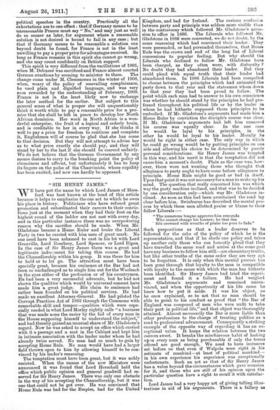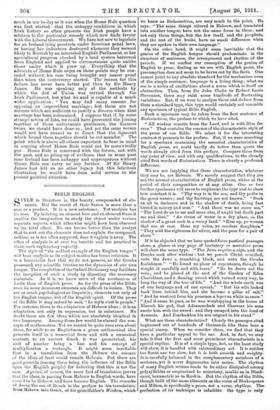" SIR HENRY JAMES."
WE have put the name by which Lord James of Here- ford was best known at the head of this article because it helps to emphasize the one act to which he owes his place in history. Politicians who have refused great promotion and subordinated their careers to their convic- tions just at the moment when they had their foot on the highest round of the ladder are not met with every day, and in this particular instance there was no overpowering reason why the sacrifice should be made. When Mr. Gladstone became a Home Ruler and broke the Liberal Party in two he carried with him men of great mark. No one need have been ashamed to cast in his lot with Lord Granville, Lord Rosebery, Lord Spencer, or Lord Ripon. In the case of Sir Henry James there was a great and Legitimate inducement for taking this course. He had the Chancellorship within his grasp. It was there for him to hold or to let go. The attraction must have been specially great, because his eminence at the Bar had not been so unchallenged as to single him out for the Woolsack in the eyes either of the profession or of his countrymen. He had been a very successful advocate, but he had not shown the dualities which would by universal consent have made him a great judge. His claim to eminence had rather been founded on his political services. He had made an excellent Attorney-General. He had piloted the Corrupt Practices Act of 1883 through the Commons with remarkable skill and temper—qualities which were espe- cially needed in what Lord Morley rightly calls " a business that was made none the easier by the fad of every man in the House supposing himself to understand the subject," and had thereby gained an unusual share of Mr. Gladstone's regard. Now he was asked to accept an office which carried with it a peerage and a seat in the Cabinet and kept him in intimate association with the leader under whom he had already twice served. No man had so much to gain by accepting Home Rule. No man would have had a larger field thrown open to him by allowing himself to be con- vinced by his leader's reasoning.
The temptation must have been great, but it was nobly resisted. When the names of the new Ministers were announced it was found that Lord Herschell held the office which public opinion and general goodwill had re- served for Sir Henry James. There was only one obstacle in the way of his accepting the Chancellorship, but it was one that could not be got over. He was convinced that Home Rule was bad for the Empire, bad for the United Kingdom, and bad for Ireland. The curious confusion between party and principle was seldom more visible than in the controversy which followed Mr. Gladstone's acces. sion to office in 1886. The Liberals who followed Mr. Gladstone in 1886 were converted, we do not doubt, by the same reasoning which had convinced their leader. They were persuaded, or had persuaded themselves, that Home Rule was the crown and end of the long list of Liberal concessions to popular feeling. But why should the Liberals who declined to follow Mr. Gladstone have been charged, as they often were, with disloyalty ? No doubt they had abandoned their leader. But they could plead with equal truth that their leader had abandoned them. In 1886 Liberals had been compelled to choose between the principles which had animated the party down to that year and the statesman whom down to that year they had been proud to follow. The point which each man had to answer to his own conscience was whether he should stand by the principles he had pro- fessed throughout his political life or by the leader in whom he had hitherto supposed those principles to be embodied. If Mr. Gladstone's arguments had made him a Home Ruler by conviction the disciple's course was clear. If Mr. Gladstone's arguments had left him unmoved his course was equally clear. In the one case he would be loyal to his principles, in the other he would be loyal to his leader. Morally he would be right in either case. The only way in which he could go wrong would be by putting principles on one side and allowing his choice to be determined by purely personal considerations. Sir Henry James was tempted in this way, and his merit is that the temptation did not cause him a moment's doubt. Plain as the case was, how- ever, there were not wanting those who thought that allegiance to party ought to have come before allegiance to principle. Home Rule might be good or bad in itself. Upon that point it was not necessaryfor a man to make up his mind. The question that really concerned him was which way the party machine inclined, and that was to be decided by one consideration only—which way Mr. Gladstone in- clined. As soon as this had been ascertained the road lay clear before him. Swinburne has described the mental pro- cess by which these men allotted praise or blame to their fellow Liberals :— " The numerous tongue approves him renegade Who cannot change his banner; he that can
Sits crowned with wreaths of praise too pure to fade."
Such propositions as that a leader deserves to be followed for the sake of the policy of which he is the representative, and that if he sheds one policy and takes up another only those who can honestly plead that they have travelled the same road and arrive at the same goal have any business to follow him still—are elementary truths, but like other truths of the same order they are very apt to be forgotten. It is only when this mental process has been gone through that loyalty to the man is compatible with loyalty to the cause with which the man has hitherto been identified. Sir Henry James had tried the experi- ment and found it a failure. He had weighed Mr. Gladstone's arguments and remained uncon- vinced, and when the opportunity of his life came he knew how to put it aside. It was his object, as he once explained, so .to act that no man should be able to point to his conduct as proof that " the Bar of England was composed of men who were unfit to take their part in political life," and that object was thoroughly attained. Almost necessarily the Bar is more liable than other professions to the charge of treating politics as a road to professional advancement. Consequently a striking example of the opposite way of regarding it has an ex- ceptional value. It keeps the relation between the two careers sweet. It breaks the mischievous habit of looking upon every man as being purchasable if only the terms offered are good enough. We need to have instances set before us that even if Walpole were right in his estimate of mankind—at least of political mankind— in his own experience his experience was exceptionally unfortunate. Such an act as that of Sir Henry James has a value beyond the circumstances which gave occasion for it, and those who are still of his opinion upon the particular question have a right to recall it with satisfac- tion.
Lord James bad a very happy art of giving telling illus- trations in aid of his arguments. There is a fallacy as
much in use to-day as it was when the Home Rule question was first started—that the unhappy conditions in which Irish history so often presents the Irish people have a relation to the particular remedy which now finds favour with the Liberal Government. We have not now to legislate
for an Ireland lying prostrate under ferocious laws, or having her industries destroyed whenever ger seemed likely to flourish by an interested English Parliament, or her agricultural progress checked by a land system borrowed from England and applied to circumstances quite unlike those under which it grew up. Everything that the advocate of Home Rule urges on these points may be con- ceded without his case being brought any nearer proof than when the controversy started. The reason for this failure has never been better put than by Sir Henry James. He was speaking only of the methods by which the Act of Union was carried through the Irish Parliament, but what he said is capable of a much wider application : " You may find many reasons for opposing an improvident marriage ; but these are not reasons which are sufficient to justify a divorce when that marriage has been solemnized. I suppose that if, by some strange action of fate, we could have prevented the joining together of those unfortunate gentlemen, the Siamese twins, we should have done so ; and yet the same reason would not have caused us to direct that the ligament which bound them together should be cut asunder." The point which is above all others important to bear in mind in arguing about Home Rule could not be more vividly put. Home Rule is concerned with the future, not with the past, and no piling-up of evidence that in some past time Ireland has been unhappy and unprosperous without Home Rule can carry us any further. If Sir Henry James had left us no other legacy but this felicitous illustration he would have done solid service to the present political situation.



































 Previous page
Previous page